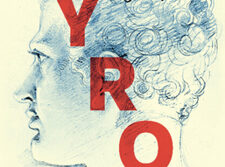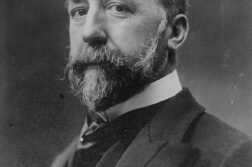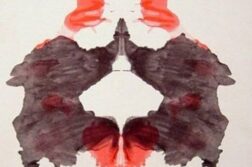REREADING “My Life as a Christian,” which would later become a play that I last performed in the previous millennium under the title, The King of Kings and I: The Greatest Story Ever Kvetched, I was haunted by the arguments that I didn’t make.
Times were so different then, both in 1993, when I wrote the piece, and in 1973, when the play took place. I had thought that my comic premise wasn’t all that controversial: a Jewish boy from Long Island, in the process of coming out as gay, takes a spiritual detour, and becomes a born-again Christian for a few weeks. This is pretty much what happened to me and, from the start, I wanted to avoid any great political or theological debates and emphasize the comic gefilte-fish-out-of-water angle of the story. My inspiration was the plot-line in the movie Hannah and Her Sisters when Woody Allen, a Jewish hypochondriac, decides to become a Catholic and starts by going to the supermarket and buying a loaf of white bread and jar of mayonnaise. I wanted to make fun of both my youthful naïveté and the youthful naïveté of the early 70’s, when it wasn’t all that unusual for middle-class kids from Levittown to shave their heads, shout “Hare Krishna,” and sell incense in airports.
I soon realized that I’d bitten off more than my comic mind could chew. By 1993 the political context had shifted dramatically. As I stated briefly in the play’s opening monologue, in 1973 born-again Christians had not yet become Evangelical Storm Troopers. The culture wars at that time weren’t as yet being fought along religious lines. My enemy was still the military-industrial complex, while the Christians I met were for the most part recently cleaned-up hippies that one might label progressive in that they wanted a world in which alternatives to war were actively pursued. In other words, the word “Christian” wasn’t always followed by the word “Right.” I’m not sure when that changed, but by 1993 Pat Buchanan had long since declared a holy war against homosexuals, and my core gay audience expected that I would use my play to repudiate his brand of religious fascism.
And I wish I had. Because since then, things have only gotten much worse. Looking back from our post-9/11 perspective, one might easily argue that just as a few extremists have hijacked Islam, Christianity has been politicized by those who would use it as a weapon with which to bully the rest of the world—starting with the American public—in order to keep stealing its money, resources, and labor. In other words, an unholy alliance has been formed between the folks with the big guns and the folks who believe that God—their God—would write only one book and have only one son.
Yes, I wish I had been a little more ambitious and outraged when I wrote “My Life as a Christian.” But who in 1993 could have dreamed that our country would elect—with a little help from the Supreme Court—a shameless born-again ideologue who would happily drag us back into the Dark Ages? In terms of domestic policy, this president seems to long for a return to the 1890’s, the Gilded Age in its senile years, before the federal government took on the robber barons. In the realm of foreign policy, he seems to prefer the 1190’s, when Richard the Lion-Hearted was embarking on one of his crusades to the Holy Land in a war of Christianity against Islam. (This scenario was nicely encapsulated in recent speeches by General William Boykin, who sees the war in Iraq as a war between the Christian God and Allah—and rather than fire the guy, Bush leapt to his defense!)
But I’m not here to talk about George W. Bush. You can guess where I stand on his policies. I’ve already impeached him three times this week on the Internet, and if I ever had a child I would name it Howard Dean—even if it were a girl. The point I’m trying to make is that my play, I’m afraid, is hopelessly outdated not just in terms of audience but also in terms of what I find compelling and what I no longer want to promote. For it’s not just the Christianity of the piece that makes me squeamish. It’s also the Jewishness. In this play I write about a happy ending in which I accept “who I am” and re-enter the fold of what I now call Suburban Judaism, a state of mind in which one doesn’t believe anything about the Bible and yet one continues to go to the temple on the High Holy Days and kiss the book as it’s carried around the room. I’m not sure that’s such a good thing anymore. In other words, in 1993 I was still willing to assume that the Judaism in which I’d been raised was a force for good in the world.
Now I’m not so sure.
On a planet as small as ours, can we really afford to have any group assuming that we’re the Chosen People? And even if Judaism is not as bad as Islam or Christianity in that it doesn’t care to proselytize, it’s still an irrational belief system based on some musty old book that’s clearly the last refuge of homophobes. More dangerous still, it’s the raison d’être for a political state that is essentially racist and increasingly dangerous to both its citizens and its neighbors. I knew I’d become radicalized when last year I was invited to my niece’s Bat Mitzvah and I found myself not wanting to go. And when I saw my niece and her friends doing Israeli folk dances accompanied by bearded men singing a cappella because musical instruments weren’t allowed to be played on the Sabbath, I felt queasy inside. When did my old hippie brother start taking Leviticus seriously? Worst of all, I was probably the only one in the room whose blood ran cold as I watched yet another generation being brainwashed into a cult no more rational than the one that led those folks to dress in purple and wait to be taken home in space ships.
I fear that one of the casualties of 9/11 has been my sense of humor on the subject of organized religion, particularly the Abrahamic faiths that are currently blowing each other up in what we oddly refer to as the Holy Land. Now, I must be fair. One can be a Muslim without being a terrorist. One can be Jewish without supporting the current Israeli government. And one can even be a Christian without being a Republican. In my heart of hearts I’d love to see our current crop of religious traditions being used to promote nothing but peace and love—but I’m not counting on it. In the meantime, I’ll continue worshipping the Goddess while walking my dogs on the beach, being kind to my neighbors, and supporting any progressive candidate who genuinely believes in the separation of church and state.
— Provincetown, November 2003
__________________________________________
FROM Spring, 1994
My Life as a Christian
IN 1973 I saw Jesus. I know what you’re thinking. You live in Manhattan. Sooner or later you bump into everyone. And that’s true. The other day I did see Cardinal O’Connor buying a knish in front of the Plaza Hotel, but that didn’t change my life. When I saw Jesus, I was shocked! I mean, we both were shocked. God knows what he was expecting, but look at me. I’m not Pat Boone. But I did see him just like I’m looking at you—and it wasn’t in New York. It was in Berkeley, California, and when I saw Jesus, I did what you’re supposed to do when you see Jesus. I became a Christian. I became a Christian.
Everything was so different back then. I had dropped out of college and was hitchhiking out West. I wasn’t really out of the closet yet, and this was before Pentecostals became evangelical Storm Troopers. No, Christians were more like—they were like my neighbors. You see, I grew up in a Catholic neighborhood, and my life as a Christian really began when I was nine years old, the first time I saw a picture of Him.
Jaffe turns the Ansel Adams photograph around and there’s an eight-by-ten picture of Jesus, with halo and all loving eyes pointed heavenward on the other side.
And I remember being absolutely stunned that this half-man, half-god would just be hanging on the wall between a pair of bunk beds. First of all, to a Jewish kid, the idea of God even having a picture is totally against our creed. The one thing they drummed into our heads in Hebrew school was that God didn’t look like anything. I mean, God was so remote that you couldn’t even write his name. It was always spelled G-D. Like God didn’t know we were talking about him? He’d have to be the dumbest schmuck on The Wheel of Fortune: “I’d like to buy a vowel, please.”
The only picture I’d ever seen of G-D was a cartoon on the cover of some children’s Bible that I’d inherited from my cousin Stuart.
Jaffe opens a kitchen cabinet to reveal a colored illustration of Jehovah.
And God was like this very old man and he was sitting astride the Creation wearing this striped bathrobe—which I thought was a little informal for the King of the Universe. But then again, this was before he created daytime, so if you’re sitting in the dark, why bother to get dressed?
Anyway, the day I saw this picture of Jesus I was with my new next-door neighbor Debbie McDermott. We had just moved from Brooklyn, the homeland of my people, and into what was then called a suburban “development,” which looked like a cross between an actual neighborhood and a low-security prison. Now the neighborhood back in Brooklyn was mostly Jewish, but on Long Island our neighbors were mostly Irish and Italian. There was only one other Jewish family on the block, the Litvaks, and when I asked my mother why we moved there she said that she thought that, once the Jews moved in, the goyim would move out. I think she overestimated our ability to create a ghetto.
I’ll never forget that first December when the neighbors started wrapping their houses with lights and setting up garish dioramas. It was like I’d died and gone to Las Vegas. The next year all the other kids gave each other Christmas cards and I’d get cards that said, “Seasons Greetings.” Seasons greetings. Like I was getting a card because it was winter? Then my father tried to build up Chanukah into this major league holiday: It’s based on a miracle. They took oil that was supposed to last one day and they made it last eight. I remember thinking, “Mom performs that same miracle with pot roast.”
For the first time, I began to notice how all our holidays seemed somewhat beside the point. Like Sukkos, the Jewish harvest festival. When was the last time you met a Jewish farmer? Jews—we don’t even celebrate our holidays—we observe them: “There goes Tisha B’Av. There goes Tu B’Shvat.” The Catholic holidays seemed much more exotic. They had all these great saints. And they had pictures of them all over the house. Prayer cards, statues, and paintings. We Jews don’t have saints. You know why? We don’t like to dust. Like I said before, we have one God, and he’s invisible. You don’t have to keep wiping him off.
So there I was, up in Debbie McDermott’s room. Now Debbie was one of twelve kids—and you know how in those really big families, the mother runs out of chromosomes—so the last few turn out pale. They have little tiny fingernails. Anyway, I noticed these two paintings on the wall. I recognized President Kennedy, but I wasn’t completely sure who the other guy was. Maybe he was another saint. So Debbie says:
“That’s Jesus. He’s the son of God.”
“Really? Does God have any other kids I don’t know about?”
“That’s his only son. He brought him to Earth and hung him on a cross.”
“And I thought my father was strict!”
“He died on Friday, stayed dead on Saturday and then came back to life on Sunday.”
“Our father who art in heaven, hallowed be thy name.” And then Debbie told me how, when she died, Jesus would lift her up and take her in his arms. And that was the first time I saw Jesus.
So that’s the difference between us and them. They have magic; they have this wonderful young god who’s so sweet and sexy and… Did I mention that Debbie had a brother?
Debbie’s brother Bobby was eight months older than she was. Eight months. He was the type of kid who would rip earwigs apart just to see which half could still crawl away. But for the next two years we always hung out together. It was like he needed a witness to his crimes. The night he threw an egg at the Litvak’s house I was waiting in the driveway praying that we wouldn’t get caught. I was like Albert Speer to his Hitler. But then Bobby went away to junior high school and I didn’t see him for a while. He was playing short stop on the baseball team.
Something I could never do. This was a bad time for me. I was ugly. My glasses were always taped up and my teeth were like Mah Jong tiles. Even worse, I was forced to go to Hebrew school three times a week in a carpool with Joel Litvak. I would sink down in the back seat as far as I could go, thinking “I don’t belong with this kid. I belong with Bobby! Bobby would never throw an egg at my house.”
One day in June, Bobby purposely tripped somebody running to third base and they threw him off the baseball team. That’s when he would come home early from school and mope around his backyard saying things like, “I hate this fuckin’ town. I’m gonna move to fuckin’ Wyoming and live in a fuckin’ tent!” Once, when he saw me peeking through the bushes, he invited me to go swimming in his four-foot pool—and we swam around the sides of his pool until we made a whirlpool. Then he gave me a towel to dry myself off and I was just so surprised that somebody who talked so dirty would have such clean-smelling laundry.
That night I asked my mother: “Mom, could I have money to buy a tent? I want to sleep outside.”[…]
So the next night with Bobby, I pretend to be asleep but I keep one eye open. Bobby’s playing with himself. I’m fascinated by the look on his face. I’ve never seen him concentrate so hard on anything. And when he sees me looking he puts my hands down my pants and we both concentrate together. The next morning, I press myself against my friend. This is our home now. Bobby jumps up as from a nightmare. His eyes shift back and forth as if someone were attacking the tent from the outside—like John Wayne at the Alamo.
“I gotta go,” he says. “I gotta go to confession.” He’s riding his bike. I’m going with him. I climb onto the back of his banana seat and hold onto the sides of his shirt. He’s pedaling furiously. We ride about a mile out of the development. Then we pull up to the church doors—a perfect replica of Donatello’s Gates of Heaven molded out of aluminum—and Bobby jumps off the bicycle and runs up the steps. Then he slips inside and I don’t see him for half an hour. He’s in there talking with some other guy. Stripping his soul naked.
Across the street there’s a parochial school with a 20-foot stainless steel cross. It looks like an antenna. If the King of the Universe is really an old man up there in a striped bathrobe, he could be picking up radio signals. He could be reading my mind! I close my eyes and try not to think about Bobby.
The next thing I know Bobby is grabbing his bicycle. “Bobby!”
Bobby doesn’t even look at me. He gets on his bicycle and rides away. “Bobby!”
I yell as loud as I could but I can’t throw my voice far enough to reach him. I even throw my voice like a girl. So I start walking home and by the time I get there it’s dark and now I hate Bobby McDermott. And I hate that he got to go inside the church and dump his sins while I have to carry mine around with me for the rest of my life. That day I learned a valuable lesson. Christians pray to Jesus while Jews—God help us—we just feel like him.
Now, every time I drive past St. Martin’s Church, I get an empty feeling in the pit of my stomach. It’s strange. I didn’t know that I loved Bobby. I didn’t have the word for it. And when you don’t have the word for something it’s easy to forget. All I knew was that a big piece of my life was missing and that some day, something—or somebody—would come along and save me.
Jaffe Cohen wrote the screenplay for the film, Hit and Runway, and is currently working on a novel. He continues to perform stand-up and to contribute to this journal.





